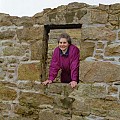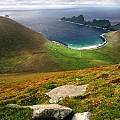


The Girl from St. Kilda
In the spring of 1997, Neil's mother - Mae - made an emotional return to St Kilda at the age of seventy-five. Here she had been born in 1918. She was still little more than a babe in arms when her father removed the family to the mainland of Harris, in 1922: eight years later, on Friday 29th August 1930, the last thirty-six souls of the St Kilda community were evacuated, at their own request, to new homes at assorted locations up and down the West Highlands.
Thus vanished an ancient community which, nearly eighty years on, still exerts an astonishing pull on the global imagination - inspiring films, poetry, fable, novels, drama and even, in 2007, an extraordinary German opera.
Mae MacDonald, as she then was, was only four when they left St Kilda and would be the first to admit her memories were scanty and that most of what she knew had been retailed, as she grew up, by her parents and her older brothers and sisters. Indeed, two sisters never left the archipelago - lost in infancy, they lie on Hiorta to this day, their graves marked only by anonymous boulders, to be joined in 1980 by the ashes of two elderly brothers.
She grew up on Harris, married a Stornoway postman, bore four sons - including Neil - and spent her last decades in an immaculately kept, anonymous little council house in the Hebridean capital.
Mae was the youngest of eleven children - seven girls and four boys - in the last generation of a line who could trace their ancestry on the island back to the early seventeenth century. By the 1990s she was one of only a handful of the true Hiortaich alive - those who had been born on the islands - and the only one still to live in the Outer Hebrides.
Yet some memories were most vivid. "I remember the bad winters we had; they were vicious sometimes. The gales were really bad. You couldn't do anything. You couldn't go out in that kind of weather. But the summers were wonderful. It seemed as if there was no night...
"I remember in the winter my mothers and sisters would clear the room and my father would be at one end with the weaving loom and my mother and sisters would be at the other with their spinning wheels. That was their winter work. They had to work hard to survive, especially when the men went on the rocks for the birds...
"There was nothing there for entertainment. We made our own amusements, just visiting each other's houses and talking. It was a real community, not one family had any more than another. Everything was shared, so there was no fighting or rowing. That is how they lived..."
Less pleasant were recollections - all too vivid - of the day they left, that emotional day in 1922, on the tossing, greasy deck of a whaler out of Harris. There were still whale carcasses lashed to the hull and, as they struggled east to that island's shelter, a violent storm blew up. "I remember big waves, and the smell of the whales," Mae would recall. "I thought we were going to die..."
Things were easier, much easier, seventy-years later, as Mae prepared to return at last to see the far islands of her birth - a "sprightly granny in the unlikely garb of a hi-tech survival suit." She, Neil and Rhoda had the luxury of a Sikorsky 6IN helicopter, though the little old lady had obediently to sit through an instruction video before wrestling herself gamely into the thick all-in-one suit in blazing orange. "Is it St Kilda we're going to, or the Moon?"
She was beside herself with excitement when, with the hour, they touched down. "Neil, are you not glad you're a Hiortach?" And then, slowly, wide-eyed, the careful side of tearful, she wandered around the Village and around her memories. At 3 Main Street, she stepped inside her old home - now restored, got up as something of a museum.
"That's where we used to roast the puffins in the ashes of a peat fire. Better than any turkey or chicken, they were..." Taking the visitor's book, she signed her name and inscribed carefully, beside it, "Born in this house."
Later, Mae laid flowers by the family graves, later still was treated to a little champagne, and finally gave a brief little speech of thanks. "This has been a wonderful day that will live in my memory for the rest of my life..."
Tha mi air ais, she had repeated once and again, picking her way about the village. I am back...
Mae MacLeod, a frequent visitor to her family in South Shawbost, passed away just before Christmas 2001.



